“Give 10$, Get 10$”. A simple referral program like this should be easy to set up and track. The reality is that word-of-mouth programs aren’t ‘fire-and-forget’ campaigns. These campaigns require constant optimization and customer engagement. You need to offer customer-aligned rewards, easy-to-use processes, and build campaigns that resonate with customers. Plus, tracking and reporting capabilities are needed to see who to reward and how much.
Getting your development team to build referral tech will be cheaper and quicker. However, in-house-built solutions rarely work at the high level that dedicated software does and often miss essential components. Additionally, building your own software requires niche expertise in the referral channel and substantial time and resources.
Let’s examine the cost-benefits of buying versus building referral software and what to look for when sourcing external software.
Building a referral software can allow for a bit more program control but can be costly
Building internal tech may give your company a higher degree of customization and program control. However, this autonomy comes at a substantial cost. Developing a custom solution requires significant investment in time, money, and human resources. Your development team should dedicate countless hours to coding, debugging, and testing to ensure functionality.
Maintaining and updating the system to keep up with technological advancements and user requirements can strain in-house resources. This ongoing commitment can divert attention away from core business activities and impact productivity.
Buying good referral software saves time and resources in the long run
Investing in good external customer advocacy software can save both time and resources. These solutions have been thoroughly developed and tested, allowing you to quickly launch a successful referral campaign without having technical issues or delays. Automating word-of-mouth campaigns reduces the need for manual tracking and data entry, which can be time-consuming and error-prone.
Good external software programs have built-in analytics and reporting tools to easily monitor campaign performance and make data-driven decisions. This eliminates the need for additional employees or resources to manage and analyze data. Plus, many external providers offer ongoing support and updates to ensure your program stays effective.
Cost-benefit analysis and drawbacks of buying vs building customer referral marketing software
Costs of buying vs building referral software: Subscription fee and integration expenses vs startup and ongoing maintenance costs
Buying referral software comes with subscription costs and possible expenses for technical integration and staff training for complex platforms. Conversely, building referral software requires significant initial and ongoing development costs, including hiring or reallocating developers, project managers, and consultants.
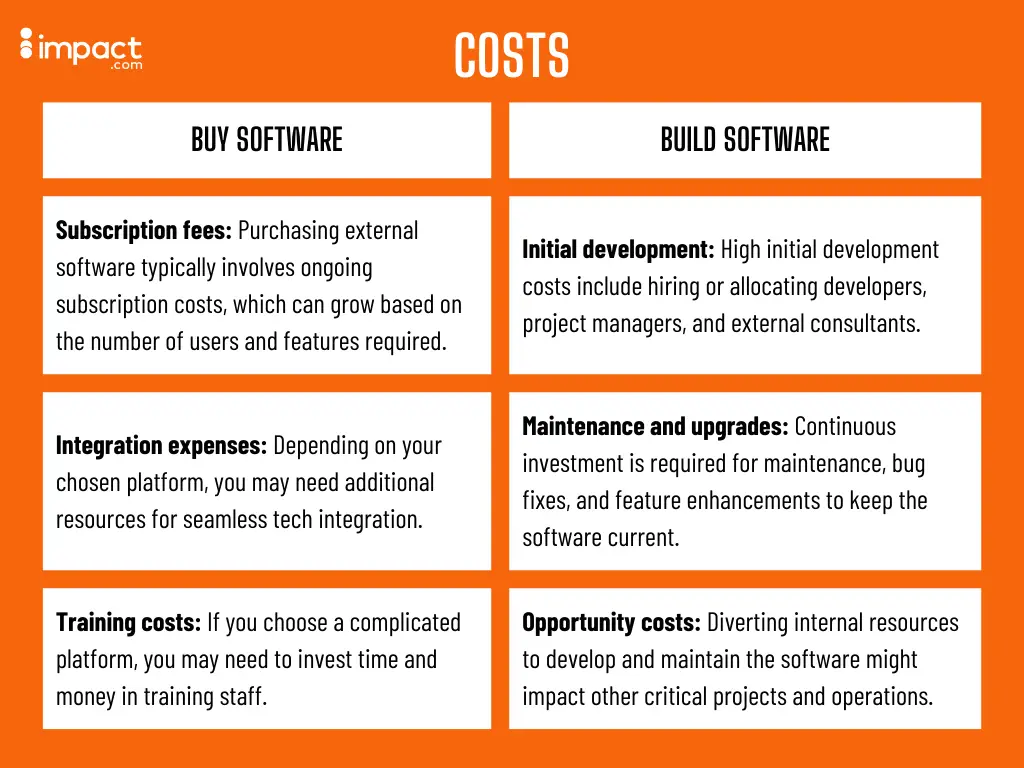
Benefits of buying vs building referral software: More scalability and features and fewer team resources vs more brand ownership
External software offers immediate implementation, advanced features and scalability, continuous support and updates, and reduced maintenance. Building software may give you more program control and customization but often lacks advanced features and external support.
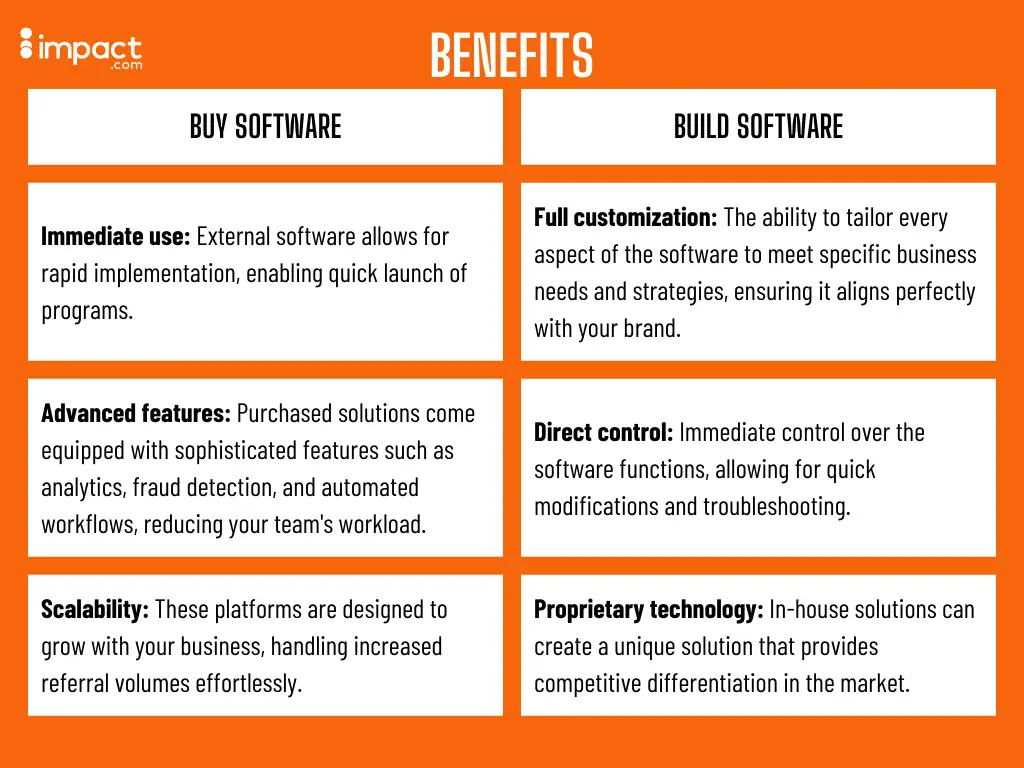
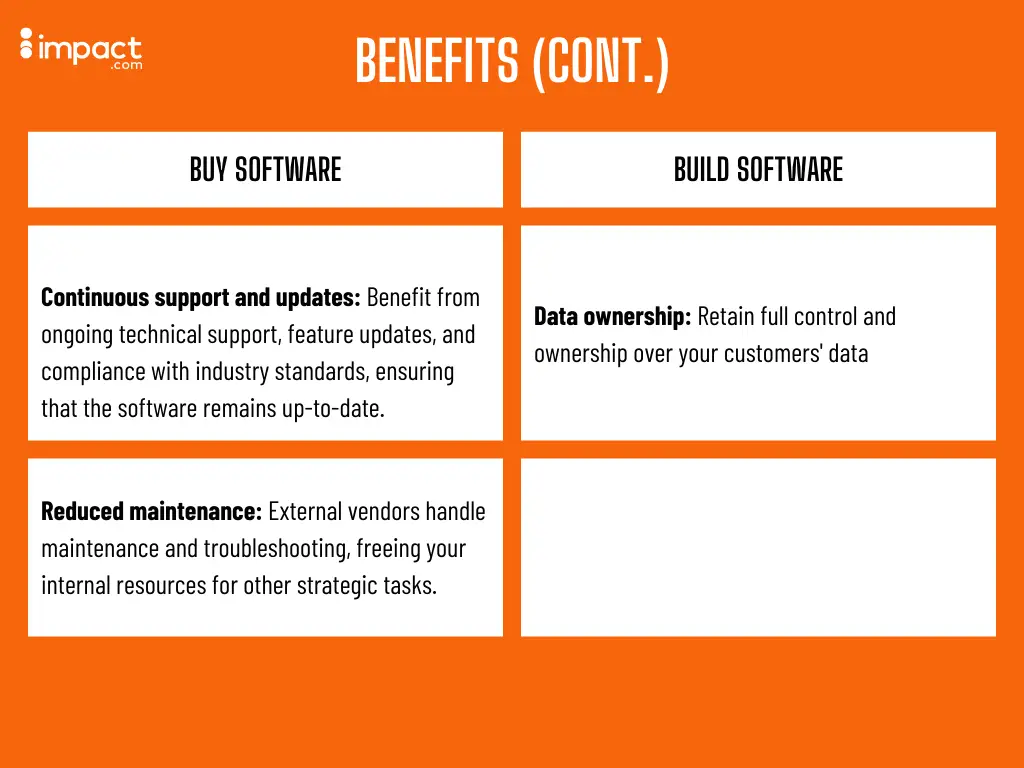
Drawbacks of buying vs building a referral software: Possible lack of customization vs lack of technical support and many resources needed
Although buying referral software can sometimes lead to a lack of customization and brand messaging control, building in-house software comes with its own set of challenges. These include needing substantial long-term resources and specialized expertise for building robust tracking and reporting features.
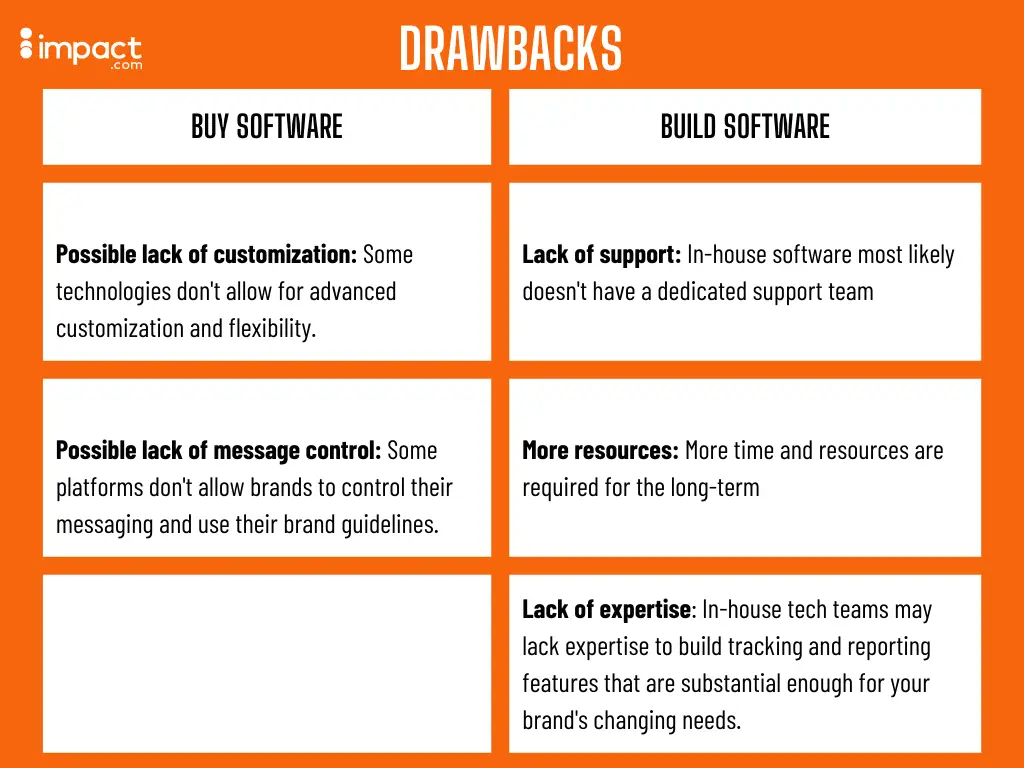
Choosing the right referral platform solves cost, brand ownership, and data privacy challenges
Although you have to pay for a monthly subscription for software, this is a long-term investment requiring minimal effort from your internal team. Choosing a platform with advanced flexibility and customizability will help you create on-brand programs that you can adjust anytime to suit your goals.
Building software can far outweigh the costs of a monthly subscription fee, considering the time and resources it takes. Also, choosing a good piece of external software ensures your customer’s data is always protected.
Here are some key features to look for when sourcing referral software:
The flexibility of rules and the ability to adjust to your brand’s goals
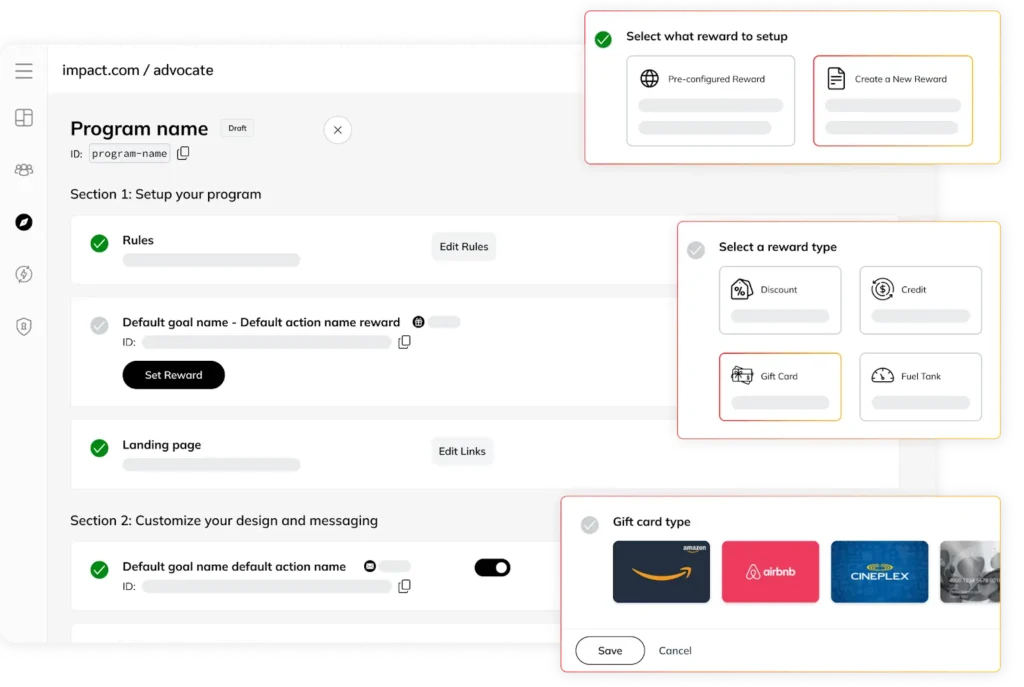
Consider the flexibility of rules when evaluating referral software. If you have a basic program, limited adjustments to the rules may be sufficient. However, most brands need greater flexibility to achieve success. Key considerations are customizable widgets, matching your brand’s look and feel, and customer user-friendliness.
Deep reporting insights so you can reward the right advocates with the rewards they love
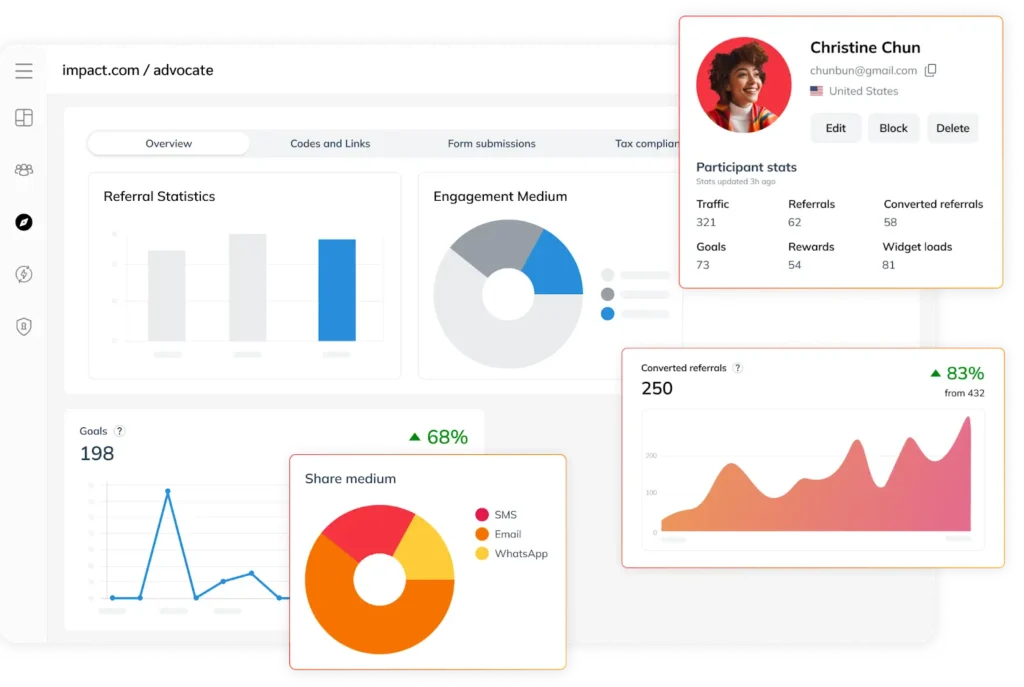
Top customer advocates who exceed ten referrals often function as affiliates or influencers, making it an ideal time to recruit them as partners. Advanced technology can identify these top referrers and engage with them automatically. By tracking referrals over time, you can uncover promising candidates for deeper relationships, strengthening customer trust in your brand.
Advanced fraud detection and prevention to protect your program
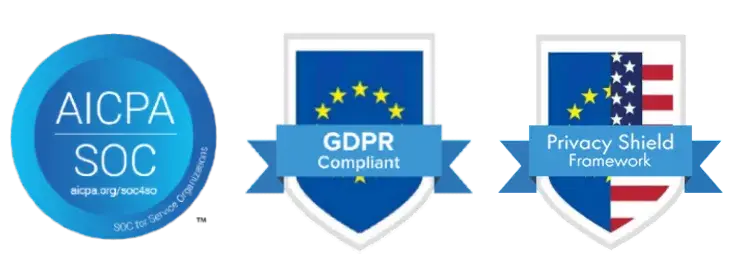
Referral technology should be able to identify suspicious activities, such as self-referrals and excessive program use. For customer data safety, using GDPR-compliant systems is recommended. An effective platform will adhere to GDPR standards by refraining from collecting identifiable information or creating profiles for referred customers until they consent to share their details.
Scalability to grow your program at any time
External software can seamlessly handle your business growth. As your customer base expands, these tools can easily accommodate increased volume and complexity, ensuring that your campaigns remain robust and efficient without additional development efforts from your team.
The ability to seamlessly integrate with your existing tech stack
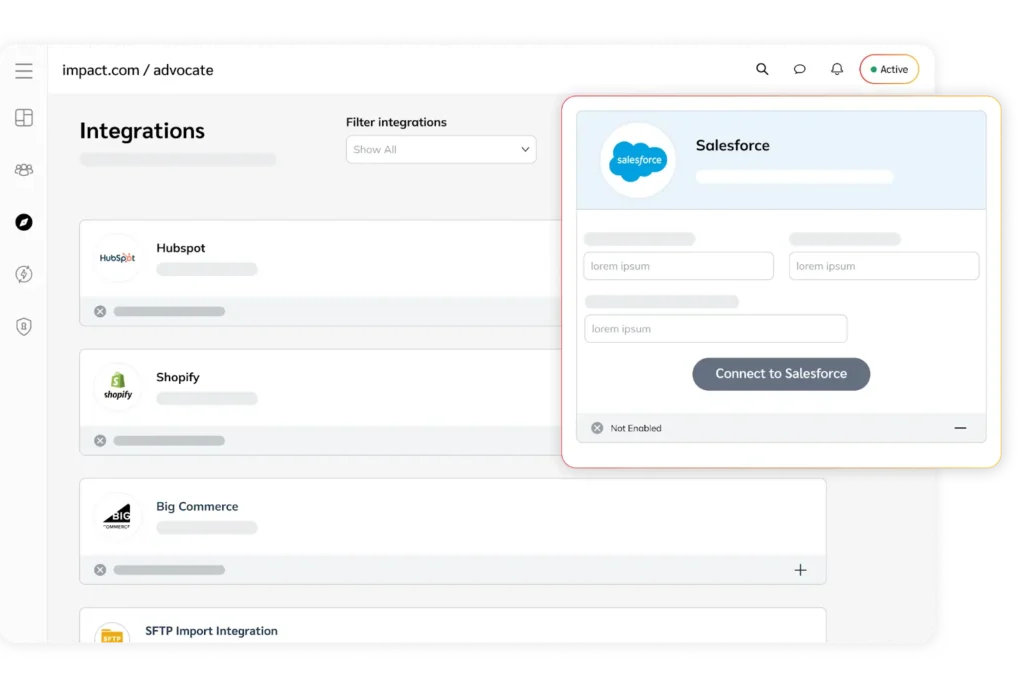
Dedicated referral marketing software often comes with pre-built integrations for popular CRM, email marketing, and ecommerce platforms. Quick and easy interconnectivity ensures your program works harmoniously with existing tech stacks, streamlining processes and enhancing overall operational efficiency.
Automated and intuitive workflows that save time and resources
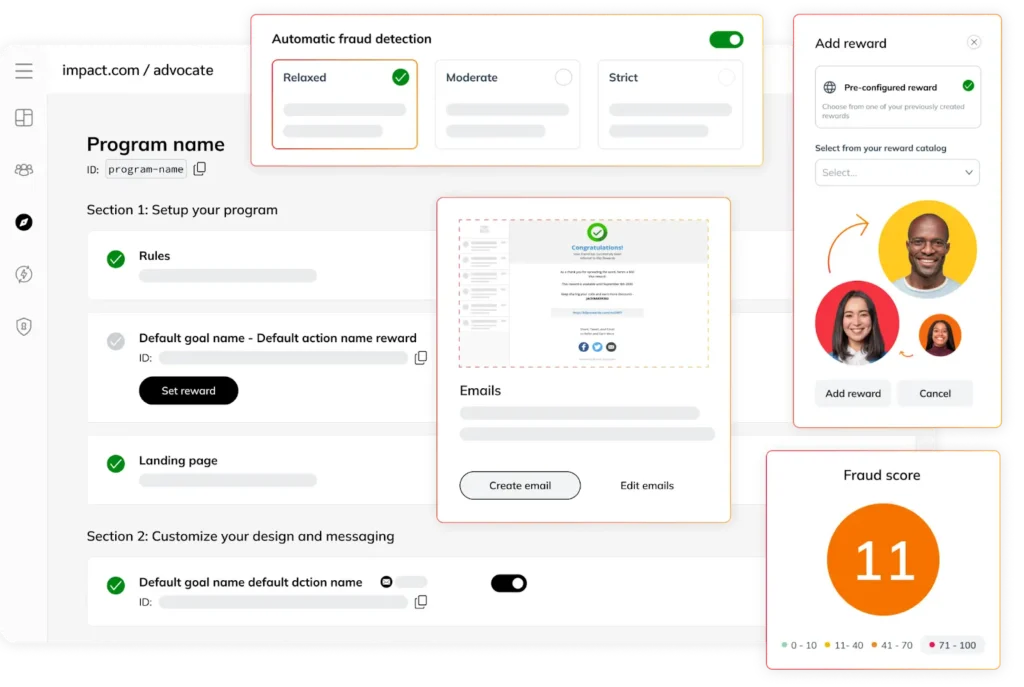
Automated workflows manage everything from tracking the referrer to rewards payouts. These workflows streamline your processes, reduce manual errors, and ensure timely and accurate reward distribution. Also, using an easy-to-use platform will go a long way towards increased productivity.
Jobber achieved exponential success with external vs. internal customer referral software
Jobber, a home service business management platform, had challenges with its internally built referral software. The company couldn’t make quick program changes and segment user groups with its former program. Also, incomplete analytics made determining how to optimize program performance difficult.
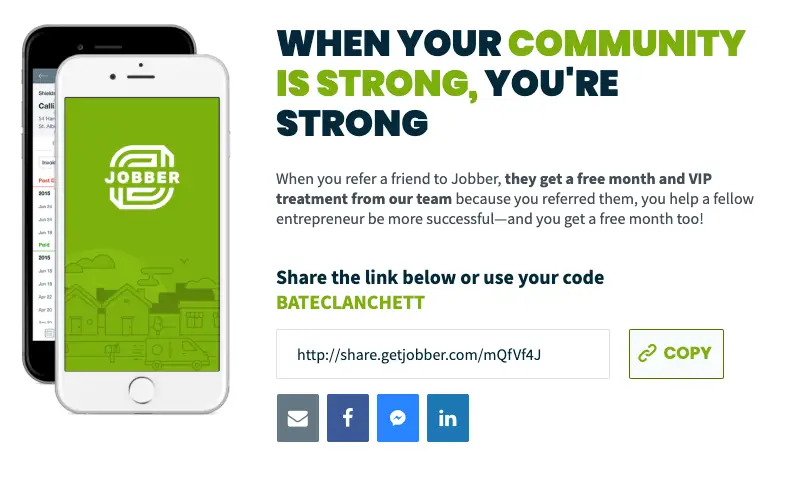
Jobber switched to impact.com/advocate to enhance business growth and community engagement. With this external tech, the brand could view essential metrics and analytics that showed the best-performing channels, share mediums, and rewards. This detailed information allowed it to make well-informed programmatic decisions, and quickly optimize for better program performance. The result was almost 5 percent higher lifetime value and over 18 percent higher average selling price for referred vs non-referred customers.
Save resources and gain greater ROI with external customer referral software
Opting for external referral marketing software presents many advantages to enhance your brand’s program. Advanced features, scalability, robust fraud detection, and seamless integration capabilities allow you to tailor programs to match your needs.
While building in-house software may offer slightly more customization and control, it often comes with substantial costs and resource commitments—this may not yield the best return on investment. Choosing a platform with advanced flexibility and customization options creates efficiency and helps you retain control of your brand’s messaging, look and feel.
Ready to grow your brand’s revenue and community engagement through word-of-mouth marketing? Contact impact.com/advocate for a demo.
FAQs about buying vs building referral software
Building a referral software allows for more customization and direct control over the software functions. However, it requires a substantial investment in time, money, and resources. On the other hand, buying external referral software allows for a quicker launch of referral programs, comes equipped with advanced features, and scales with business growth.
A flexible and powerful customer referral marketing software allows you to customize your program to match your brand’s look and feel, customize program rules to fit your desired outcomes, has deep reporting insights, and offers a wide range of rewards. Additionally, a platform should have support staff to help you with any challenges you may face when setting up and maintaining a referral program.
Key features to look for when sourcing referral software include flexibility of rules, deep reporting insights, fraud detection and prevention, scalability, the ability to seamlessly integrate with your existing tech stack, and automated workflows. These features can help you create an effective referral program tailored to your brand’s goals.








